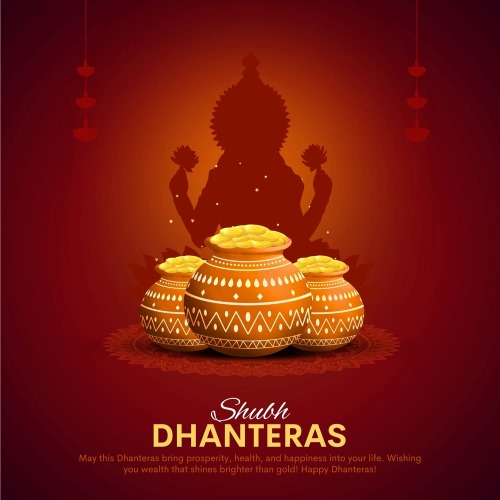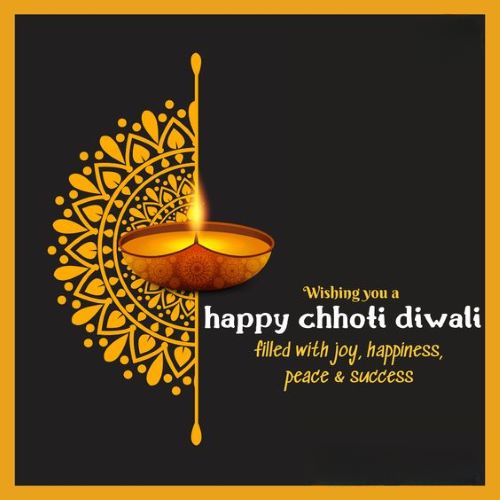Deepawali, also known as Diwali, stands as one of the most important and widely celebrated festivals in India. Symbolizing the triumph of light over darkness, knowledge over ignorance, and good over evil, this festival fosters a sense of joy, devotion, and unity among people. It is a grand occasion filled with vibrant celebrations, spiritual rituals, and social gatherings.
Rooted in ancient traditions, Deepawali carries profound spiritual significance. The word ‘Deepawali’ means "a row of lights," and its observance revolves around illuminating homes and surroundings to invite happiness and prosperity.
The festival also honours the return of Lord Rama to Ayodhya after his victory over Ravana, with the lighting of oil lamps symbolising the triumph of good over evil.
Additionally, Diwali is associated with Goddess Lakshmi, the deity of wealth and prosperity, and Lord Ganesh. It is believed that worshipping them on this day brings abundance and good fortune for the year ahead.
When is Diwali 2024?

Source: Shutterstock
Diwali is a five-day celebration that starts with Dhanteras and concludes with Bhaiya Dooj. However, the festivities vary across regions. In Maharashtra, Diwali begins a day earlier on Govatsa Dwadashi, while in Gujarat, the celebrations kick off two days earlier on Agyaras and end on Labh Panchami.
Diwali in 2024 will be celebrated on Wednesday, October 31st. Many people are unsure about the exact date to celebrate Diwali this year, so let's clear up the confusion.
Laxmi Puja will be performed on October 31, 2024, as the Amavasya moon will be visible that evening.
READ| Diwali Bank Holidays 2024: Know When Banks are Closed this Festive Season

Source: Twitter
However, in some cities, Diwali celebrations will take place on November 1, 2024. According to the Panchang, the Amavasya Tithi ends at 6:16 PM on November 1, 2024, but since Laxmi Puja is traditionally performed after sunset when the moon is visible, October 31, 2024, is considered the ideal day to celebrate Diwali.
Drikpanchang mentions: "The most auspicious time to do Diwali Puja is after sunset. The time period after sunset is known as Pradosh. The day of Diwali Puja is decided when Amavasya Tithi prevails during Pradosh."
Diwali 2024 Date in India
| Event | Date and Time |
| Diwali 2024 | 31 October |
| Lakshmi Puja Muhurat | 05:36 PM to 06:16 PM (Duration: 41 Minutes) |
| Amavasya Tithi Begins | 03:52 PM on Oct 31, 2024 |
| Amavasya Tithi Ends | 06:16 PM on Nov 01, 2024 |
Source: Drikpanchang
Diwali 2024: Lakshmi Puja Muhurat
| City | Time |
| Pune |
06:54 PM to 08:33 PM, Oct 31 |
| New Delhi |
05:36 PM to 06:16 PM |
| Chennai |
05:42 PM to 06:16 PM |
| Jaipur |
05:44 PM to 06:16 PM |
| Hyderabad |
05:44 PM to 06:16 PM |
| Gurgaon |
05:37 PM to 06:16 PM |
| Chandigarh |
05:35 PM to 06:16 PM |
| Kolkata |
05:45 PM to 06:16 PM |
| Mumbai |
06:57 PM to 08:36 PM, Oct 31 |
| Bengaluru |
06:47 PM to 08:21 PM, Oct 31 |
| Ahmedabad |
06:52 PM to 08:35 PM, Oct 31 |
| Noida |
05:35 PM to 06:16 PM |
What is the Religious Significance of Diwali?
Diwali holds diverse religious significance across India, deeply rooted in various traditions and legends. One prominent connection is to the Hindu epic Ramayana, celebrating the return of Rama, Sita, Lakshmana, and Hanuman to Ayodhya after defeating the demon king Ravana. This victory symbolizes the importance of adhering to dharma (duty) in daily life.
Another tradition recounts Krishna's triumph over the demon king Narakasura during the Dvapara Yuga, leading to the liberation of 16,000 captive girls. The day before Diwali, known as Naraka Chaturdashi, commemorates this victory of good over evil.
The festival is also linked to Goddess Lakshmi, the goddess of wealth and prosperity, whose birth is celebrated at the festival's onset, according to some contemporary sources. The night of Diwali marks her marriage to Vishnu. Alongside Lakshmi, Ganesha, the remover of obstacles, is venerated.
In eastern India, the festival is associated with Goddess Kali, representing the victory of good over evil, while in the Braj region and parts of southern India, it celebrates Krishna's defeat of Narakasura. Merchants often pray to Saraswati and Kubera for blessings in music, literature, and wealth management. In regions like Gujarat, Diwali signifies the start of the new year.
Though mythical tales differ by region and within Hindu traditions, they share common themes of righteousness, self-inquiry, and the pursuit of knowledge as a means to conquer ignorance and darkness, reflecting the belief in the ultimate triumph of good over evil.
Significance of Amavasya on Deepawali Festival
As per Hindu scriptures, Amavasya Tithi holds deep significance during Diwali. It is believed that on this day, Lord Rama returned to Ayodhya after defeating the demon king Ravana. Since it was Amavasya (a moonless night), the people of Ayodhya lit countless diyas (oil lamps) to illuminate the city and welcome Lord Rama.
This grand celebration marked his return, filling Ayodhya with joy and happiness, and the tradition of lighting lamps continues to be an integral part of Diwali festivities to honour this historic event.
When to Celebrate Diwali 2024? Complete Calendar
The celebration of Deepawali, also known as Diwali, spans over five days, each carrying its own unique significance, customs, and rituals. Here is the complete schedule for the five days of Diwali
| Date | Day | Festival Name |
| 29th October 2024 | Tuesday | Dhanteras |
| 31st October 2024 | Thursday | Choti Diwali |
| 31st October 2024 | Thursday | Badi Diwali |
| 2nd November 2024 | Saturday | Govardhan Puja |
| 3rd November 2024 | Sunday | Bhai Dooj |
Source: Drikpanchang
Everything About 5 Days of Diwali
Here’s everything you need to know about the complete five days of Diwali, a festival that lights up the hearts and homes of millions around the world.
Dhanteras (October 29, 2024)

Source: Shutterstock
Dhanteras, the first day of the Deepawali festival, is dedicated to worshipping Goddess Lakshmi, the goddess of wealth, prosperity, and abundance. On this auspicious day, people clean and decorate their homes, believing it invites Goddess Lakshmi’s blessings. They also purchase precious metals like gold, silver, or new utensils, as it is believed that doing so attracts good fortune and wealth.
Drikpanchang mentions: "Dhantrayodashi which is also known as Dhanteras is the first day of five days long Diwali festivities. On the day of Dhantrayodashi, Goddess Lakshmi came out of the ocean during the churning of the Milky Sea. Hence, Goddess Lakshmi, along with Lord Kubera who is the God of wealth, is worshipped on the auspicious day of Trayodashi."
Choti Diwali (October 31, 2024)

Source: Pinterest
On the second day of Diwali, people commemorate Lord Krishna's victory over the demon Narakasura, symbolizing the triumph of good over evil. To mark this occasion, houses are thoroughly cleaned and beautifully decorated as a way to purify the home and invite positive energies. Earthen lamps (diyas) are lit to dispel the darkness of evil and negativity, filling the surroundings with light and warmth.
In many regions of India, this day is also celebrated with the bursting of crackers, adding a festive and joyous atmosphere. The fireworks symbolize the banishment of evil forces and the arrival of prosperity and happiness. This day, often called Naraka Chaturdashi, is an integral part of the Diwali festivities, reflecting themes of cleansing, renewal, and victory.
Deepawali (October 31, 2024)

Source: Shutterstock
Diwali's main day is dedicated to worshipping Goddess Lakshmi, the deity of wealth, prosperity, and good fortune. On this auspicious evening, people gather to perform the traditional Lakshmi Puja, offering prayers, flowers, sweets, and lighting incense sticks to honour the goddess. Devotees seek her blessings for abundance and financial success in the coming year.
As part of the celebration, houses are beautifully illuminated with rows of diyas (oil lamps) and colourful decorative lights, symbolizing the triumph of light over darkness. The entire home is brightened, creating a warm and welcoming atmosphere. Families come together during this time, exchanging sweets, gifts, and heartfelt wishes, fostering a sense of unity and joy.
Govardhan Puja (November 2, 2024)

Source: Shutterstock
The fourth day of Diwali is devoted to Lord Krishna and is celebrated with the ritual of Govardhan Puja. This day holds great significance as it commemorates the legendary event when Lord Krishna lifted the Govardhan Hill on his little finger to protect the people of Vrindavan from the wrath of torrential rains, unleashed by Lord Indra. Through this act, Lord Krishna symbolized his protection of nature and mankind, urging people to worship nature and work in harmony with it.
In honour of this divine intervention, devotees prepare a variety of delicious dishes in a ritual known as Annakut (meaning "mountain of food"). A wide assortment of sweets, savouries, and traditional dishes are lovingly cooked and offered to Lord Krishna, symbolizing gratitude for his blessings and the abundance of nature’s bounty. These offerings are arranged to resemble a hill, signifying the Govardhan Mountain, and are later shared as Prasad among family and community members.
Bhai Dooj (November 3, 2024)

Source: Shutterstock
The fifth and final day of the Diwali festival is celebrated as Bhai Dooj, a day that beautifully honours the sacred bond between brothers and sisters. This festival is similar to Raksha Bandhan in its essence, as it focuses on the deep love, care, and protection shared between siblings.
On this auspicious day, sisters perform a special ritual by applying a tilak (a ceremonial mark) on their brothers’ foreheads, praying for their long life, well-being, and prosperity. In return, brothers vow to protect their sisters from harm and adversity, symbolizing the lifelong promise of support and care.
How is Diwali Celebrated?
Deepawali is known for its grand celebrations across India and in many parts of the world where Indian communities reside. The festival is a time of immense joy, where families and friends come together to celebrate unity, love, and tradition.
- Lighting Diyas and Rangoli: The lighting of oil lamps (diyas) is one of the most prominent features of Deepawali. The flickering flames of the lamps represent the victory of light over darkness. Rangoli designs, made from coloured powders, flowers, and rice, adorn the entrances of homes to welcome guests and deities.
- Bursting Firecrackers: Fireworks and fireworks are synonymous with Diwali celebrations. Although the practice has become more regulated due to environmental concerns, the sparkling display of lights in the sky adds to the festive spirit. Eco-friendly alternatives such as Green Crackers are gaining popularity to minimise pollution.
- Exchanging Gifts and Sweets: Deepawali is a time to express love and gratitude. Exchanging gifts, sweets, and dry fruits among family members, neighbours, and friends is a long-standing tradition.
- Worship and Rituals: Worshipping Goddess Lakshmi and Lord Ganesha is an essential part of Diwali. The Lakshmi Puja is performed with devotion, seeking her blessings for financial success, well-being, and peace in the household. Lord Ganesha is worshipped as the remover of obstacles and the provider of wisdom.
Deepawali 2024 is more than just a festival of lights; it is a celebration of life, prosperity, and the eternal triumph of good over evil. As people come together to celebrate, they embrace the values of family, kindness, and togetherness. The spirit of Deepawali reminds us to spread light in the darkest corners, to share joy with others, and to reflect on the blessings we have.
READ| Important Days in October 2024: National and International Dates List
Comments
All Comments (0)
Join the conversation